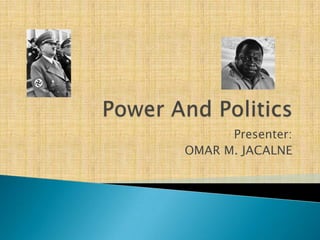
Power and politics
- 2. All leaders deal with power and politics. POWER is the ability to influence other people and events. It is the leader’s stock-in-trade, the way that leaders extend their influence to others. It is somewhat different from authority, because authority is delegated by their higher management. Power , on the other hand , is the earned and gained by the leaders on the basis of their personalities, activities and the situations in which they operate.
- 3. Formal Legitimate Expert Power Reward Power Power Types of Power Informal Coercive Information Power Power Personal Power
- 4. - also called referent power, charismatic power and power of personality, comes from each leader individually. It is the ability of a leaders to develop followers from the strength of their own personalities.
- 5. – also known as position power and official power, comes from higher established authorities to others. It gives leaders the power to control resources and to reward and punish others.
- 6. – also known as the authority of knowledge, comes from specialized learning . It is power that arises from a person’s knowledge of and information about a complex situation. It depends on education, training and experience, so it is an important type of power in our modern technological society.
- 7. -the capacity to control and administer items that are valued by another. It arises from an individual’s ability to give pay raises, recommend someone for promotion or transfer, or even make favorable work assignments. Many rewards may be under a manager’s control, and these are not limited to material items.
- 8. – is the capacity to punish another, or at least to create a perceived threat to do so. Managers with coercive power can threaten an employee’s job security, make punitive changes in someone’s work schedule, or, at the extreme, administer physical force.
- 9. – power that comes from access and control over information
- 10. The six types are developed from different sources, but they are interrelated in practice: Reward, coercive, and legitimate power are essentially derived from one’s position in the organization. Expert, information and personal power reside within the person. When even one power base is removed from a supervisor, employees may perceive that other bases of influence will decline as well. The use of a power base must fit its organizational context in order to be effective.
- 11. Resistance Compliance Commitment Resist leader’s Comply with the The most desirable initiative due to leader’s wish by outcome from consistent meeting minimal wielding power is Coercive power. expectation while commitment. holding extra Enthusiastic release effort. of energy and talent Legitimate power to satisfy leader’s will likely result request. Referent and to compliance Expert power most likely to produce commitment.
- 12. Refers to the intentional behaviors that are used to enhance or protect a person’s influence and self- interest while also inspiring confidence and trusts by others.
- 13. 1. Being socially astute (accurately perceiving and understanding what is taking place in social interactions)
- 14. 2. Having interpersonal influence (adapting one’s behaviors to most effectively elicit a desired response from others.
- 15. 3. Creating useful networks (developing contacts into useful allies and supporters)
- 16. 4. Expressing sincerity (exhibiting honest and authentic intentions in one’s interactions with others such that they trust you)
- 17. Individual factors: Inefficiency of the employee High need for power, status, security or autonomy Organizational Factors: Competition Level of organization High performance pressure
- 18. Treat the other party as a potential ally. Specify your objectives. Learn about the other party’s needs, interest and goal. Inventory your own resources to identify something of value you can offer. Assess your current relationship with the other person. Decide what to ask and what to offer. Make the actual exchange that produces a gain for both parties.
- 19. Increased employee turnover Decrease in job satisfaction Increased anxiety and stress Reduce performance
- 20. TACTICS FOR SUCCESS
- 21. Social Exchange Alliances Identification with higher authority Control of information Selective service Power and status symbol Power play networks
- 22. Omar is signing off!!!
